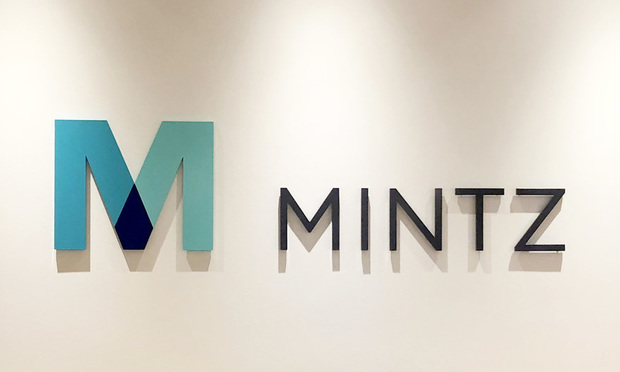'The Idea Is Not to Do This Twice': Mintz Leader on the Fight to Avoid Furloughs, Layoffs
Managing partner Bob Bodian said lawyers and staff are enduring pay cuts to avoid even worse alternatives.
April 14, 2020 at 06:23 PM
4 minute read
 Courtesy photo
Courtesy photo
Boston-founded Am Law 100 firm Mintz, Levin, Cohn, Ferris, Glovsky and Popeo, like most other major law firms, has been forced to make difficult decisions about how to manage the economic fallout of the COVID-19 pandemic.
With solid finances, a fiscal year that ends later than most and an ethos of solidarity, Mintz managing partner Robert Bodian said the firm has been able to make necessary cuts without resorting to job losses. And the idea is to keep it that way.
"Just keeping all our people here was important to us, and from a socially conscious perspective it seemed like the right thing to do," he said.
Bodian, in an email to the firm on April 10, announced reductions in staff and paraprofessional salaries by 5% across the board, except for those making under $75,000. He said the firm would also be reducing associate salaries by 10%.
 Robert Bodian of Mintz, Levin, Cohn, Ferris, Glovsky and Popeo. (Courtesy photo)
Robert Bodian of Mintz, Levin, Cohn, Ferris, Glovsky and Popeo. (Courtesy photo)Discretionary bonus payouts have been reduced by 50% for staff and taken off the table for associates. Equity partner holdbacks (profits that will be kept by the firm and not dispersed to shareholders) will now be 40%, increased from the firm's traditional 30% hold, and monthly payouts to equity partners will be reduced by 10%, with nonequity partners payouts reduced by 5%.
Bodian said even though the firm was able to prepay $10 million in expenses for 2020 and slashed department budgets to preserve jobs, it was clear that some compensation sacrifice was going to have to be made.
The timing of the firm's fiscal year-end turned out to be a blessing. Mintz has a fiscal year that ends in late March, so while many firms prepared their 2020 fiscal budgets before COVID-19 wreaked havoc on the global economy, Mintz had a chance to see what was coming and plan accordingly.
Bodian said Mintz, which according to ALM data has seen firm revenues increase by 46% over the previous five years, found both partners and associates willing to absorb short-term cuts to protect the firm.
"No one likes having their compensation cut, but the partners were very team- and firm-oriented and wanted to do something that works out all the way around," Bodian said. "There was no pressure on me to maximize partner equity. There was more pressure to make sure people are treated fairly than to maximize compensation."
"The feedback from the partners was basically that they are proud to be at a firm like this," he added.
As for the associates, he said, "it was the widely held belief that the associates would rather take a relatively digestible pay cut as opposed to having colleagues terminated."
Bodian said he hoped the budget moves would be enough to carry the firm through the crisis.
"The idea is not to do this twice. We really did try to be as reasonable and gentle as we can be with this thing," Bodian said. "Hopefully, there will come a time when the world gets back to normal," he added, "and we can restore budgets to precut conditions."
Even then, there could be some lasting changes to the industry, he suggested.
With virtually all major law firms working remotely, for example, the costs associated with office space are being scrutinized more than ever.
"That is something that I think is going to change," Bodian said of how firm's view their physical footprint. "The legal industry in this country has been behind the trend in flexible office space arrangements. Things like hoteling are common in Europe and with the accounting firms and other industries that are not common in law firms. We are looking at that more closely."
But the biggest change, Bodian said, could be to the amount of work done outside the office.
"I believe more remote working will end up being a permanent thing to some extent," he said.
Read More
After a Record Year, Venable Cuts Pay, Furloughs Some Staff to 'Prudently Prepare'
Sheppard Mullin Furloughs 33 Staff Members
Boston Firms Make Cuts, Program Changes as COVID-19 Continues to Rattle Industry
This content has been archived. It is available through our partners, LexisNexis® and Bloomberg Law.
To view this content, please continue to their sites.
Not a Lexis Subscriber?
Subscribe Now
Not a Bloomberg Law Subscriber?
Subscribe Now
NOT FOR REPRINT
© 2025 ALM Global, LLC, All Rights Reserved. Request academic re-use from www.copyright.com. All other uses, submit a request to [email protected]. For more information visit Asset & Logo Licensing.
You Might Like
View All
Law Firms Look to Gen Z for AI Skills, as 'Data Becomes the Oil of Legal'

Law Firms Expand Scope of Immigration Expertise Amid Blitz of Trump Orders
6 minute read
Losses Mount at Morris Manning, but Departing Ex-Chair Stays Bullish About His Old Firm's Future
5 minute read
Law Firms Mentioned
Trending Stories
- 1Uber Files RICO Suit Against Plaintiff-Side Firms Alleging Fraudulent Injury Claims
- 2The Law Firm Disrupted: Scrutinizing the Elephant More Than the Mouse
- 3Inherent Diminished Value Damages Unavailable to 3rd-Party Claimants, Court Says
- 4Pa. Defense Firm Sued by Client Over Ex-Eagles Player's $43.5M Med Mal Win
- 5Losses Mount at Morris Manning, but Departing Ex-Chair Stays Bullish About His Old Firm's Future
Who Got The Work
J. Brugh Lower of Gibbons has entered an appearance for industrial equipment supplier Devco Corporation in a pending trademark infringement lawsuit. The suit, accusing the defendant of selling knock-off Graco products, was filed Dec. 18 in New Jersey District Court by Rivkin Radler on behalf of Graco Inc. and Graco Minnesota. The case, assigned to U.S. District Judge Zahid N. Quraishi, is 3:24-cv-11294, Graco Inc. et al v. Devco Corporation.
Who Got The Work
Rebecca Maller-Stein and Kent A. Yalowitz of Arnold & Porter Kaye Scholer have entered their appearances for Hanaco Venture Capital and its executives, Lior Prosor and David Frankel, in a pending securities lawsuit. The action, filed on Dec. 24 in New York Southern District Court by Zell, Aron & Co. on behalf of Goldeneye Advisors, accuses the defendants of negligently and fraudulently managing the plaintiff's $1 million investment. The case, assigned to U.S. District Judge Vernon S. Broderick, is 1:24-cv-09918, Goldeneye Advisors, LLC v. Hanaco Venture Capital, Ltd. et al.
Who Got The Work
Attorneys from A&O Shearman has stepped in as defense counsel for Toronto-Dominion Bank and other defendants in a pending securities class action. The suit, filed Dec. 11 in New York Southern District Court by Bleichmar Fonti & Auld, accuses the defendants of concealing the bank's 'pervasive' deficiencies in regards to its compliance with the Bank Secrecy Act and the quality of its anti-money laundering controls. The case, assigned to U.S. District Judge Arun Subramanian, is 1:24-cv-09445, Gonzalez v. The Toronto-Dominion Bank et al.
Who Got The Work
Crown Castle International, a Pennsylvania company providing shared communications infrastructure, has turned to Luke D. Wolf of Gordon Rees Scully Mansukhani to fend off a pending breach-of-contract lawsuit. The court action, filed Nov. 25 in Michigan Eastern District Court by Hooper Hathaway PC on behalf of The Town Residences LLC, accuses Crown Castle of failing to transfer approximately $30,000 in utility payments from T-Mobile in breach of a roof-top lease and assignment agreement. The case, assigned to U.S. District Judge Susan K. Declercq, is 2:24-cv-13131, The Town Residences LLC v. T-Mobile US, Inc. et al.
Who Got The Work
Wilfred P. Coronato and Daniel M. Schwartz of McCarter & English have stepped in as defense counsel to Electrolux Home Products Inc. in a pending product liability lawsuit. The court action, filed Nov. 26 in New York Eastern District Court by Poulos Lopiccolo PC and Nagel Rice LLP on behalf of David Stern, alleges that the defendant's refrigerators’ drawers and shelving repeatedly break and fall apart within months after purchase. The case, assigned to U.S. District Judge Joan M. Azrack, is 2:24-cv-08204, Stern v. Electrolux Home Products, Inc.
Featured Firms
Law Offices of Gary Martin Hays & Associates, P.C.
(470) 294-1674
Law Offices of Mark E. Salomone
(857) 444-6468
Smith & Hassler
(713) 739-1250










